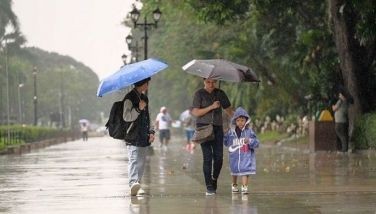21 Philippine cities most at risk from hazards globally
MANILA, Philippines — The Philippines has 21 of the 100 cities identified to be most at risk from natural hazards, an international study released Wednesday indicated.
Researchers from UK-based risk analysis firm Verisk Maplecroft combined data on risks posed by tropical storms and cyclones, floods, earthquakes, tsunamis, severe storms, extra-tropical cyclones, wildfires, storm surges, volcanoes and landslides in more than 1,300 cities.
"Of the 100 cities with the greatest exposure to natural hazards, 21 are located in the Philippines, 16 in China, 11 in Japan and 8 in Bangladesh," researchers said in a report, citing the Natural Hazards Risk Atlas. The preliminary report, however, did not specify all the 21 locations.
RELATED: Hollande: Phl must be face, voice of climate change crusade
Eight Philippine cities are also included in the ten most at risk globally, including Tuguegarao (2nd), Lucena (3rd), Manila (4th), San Fernando (5th) and Cabanatuan (6th).
Ranked first is Port Vila in Vanuatu, and Taipei in Taiwan is eighth in the list.
Lead environmental analyst Richard Hewston said the Philippines has an "extreme exposure" to natural hazards that may pose challenges to foreign businesses, supply chains and output despite the Southeast Asian country's fast-growing economy.
"As typhoon Haiyan (Super Typhoon Yolanda) in the Philippines and the tsunami in Japan showed us, natural hazard events can have far-reaching and long-lasting impacts on supply chains, business and economies," Hewston said.
He said it is an imperative for governments and the private sector to be aware of the risks and "understand how, where and why those risks manifest" to effectively manage hazards' consequences.
A warning to the Philippines
Hewston said the Philippines' natural hazard risk is worsened by its "poor institutional and societal capacity to manage, respond and recover" from incidents.
The Philippines and Japan are highly exposed to hazards, but Japan ranks higher in terms of resilience.
The Philippines (80th), is considered "high risk" in part due to "entrenched corruption" and "high levels of poverty," the report said.
"With foreign investment continuing to flow into countries highly exposed to natural hazards, those which are unable to demonstrate robust resilience may lose an element of their competitiveness," Hewston warned.
- Latest
- Trending































